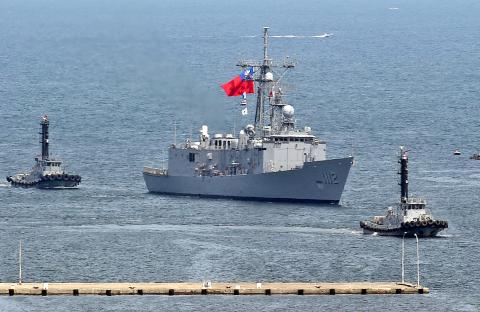The Ministry of National Defense plans to spend more than NT$1.1 billion (US$36 million) to build three special operations and counterterrorism bases over three years for use by the navy and the military police, the ministry’s budget for next year showed.
The navy is to build a multifunctional special operations training base for NT$698.04 million and a maritime special operations training base for NT$134.25 million, while NT$269.21 million has been reserved for a joint special operations training base for the military police, the document said.
The multifunctional base, which is to be equipped with computers that can simulate training scenarios, is slated for use by the Special Service Squadron of the marine corps’ Amphibious Reconnaissance and Patrol Unit, it said.

Photo: Chang Chia-ming, Taipei Times
The program is to have a NT$11.42 million budget next year and base construction should be completed in 2022, it said.
The maritime base is to be used for improving formational and individual combat skills, as well as enhancing amphibious assault and special operations capabilities, it said.
The base is to have facilities for air insertion training and hostage rescue drills on ships, vehicles and airplanes, it said, adding that the base could accommodate the training needs of other military units.
The ministry is to spend NT$4.51 million constructing the maritime base next year and completion is scheduled for 2021, it said.
The joint training base is slated for use by the military police, which has an important role in the defense of Taipei, security operations and urban warfare.
The base is to be capable of simulating conventional military combat, as well as special operations in modern built-up areas, for training of military and regular police units, it said.
The joint training base is to be allotted NT$2.12 million for the portion of the program scheduled for next year and is expected to be completed in 2022, it said.
Separately, the navy next month is to commission two Perry-class guided missile frigates that were bought from the US.
Navy Chief of Staff Vice Admiral Lee Tsung-hsiao (李宗孝) yesterday told the legislature that training and preparations are under way for the commissioning of the two vessels.
When asked how the ships would improve the nation’s defense capability, Lee said that the Perry-class’ anti-submarine capabilities are superior to those of the navy’s eight Cheng Kung-class frigates.
The two frigates, built in the 1980s and named the USS Taylor and USS Gary by the US Navy, were delivered in May last year.
Renamed Ming Chuan (銘傳) and Feng Chia (逢甲), they are to join the navy’s 146th Fleet based in Penghu and would be deployed on patrols in the Taiwan Strait, the navy said.
The vessels are highly mobile and equipped with SQQ-89 undersea warfare combat systems and SQR-19 sonar systems, both of which the navy said would bolster their anti-submarine capabilities.
In December 2014, then-US president Barack Obama authorized the sale of four Perry-class frigates to Taiwan.
The government allocated about NT$5.5 billion for the purchase of two of the ships.

The CIA has a message for Chinese government officials worried about their place in Chinese President Xi Jinping’s (習近平) government: Come work with us. The agency released two Mandarin-language videos on social media on Thursday inviting disgruntled officials to contact the CIA. The recruitment videos posted on YouTube and X racked up more than 5 million views combined in their first day. The outreach comes as CIA Director John Ratcliffe has vowed to boost the agency’s use of intelligence from human sources and its focus on China, which has recently targeted US officials with its own espionage operations. The videos are “aimed at

STEADFAST FRIEND: The bills encourage increased Taiwan-US engagement and address China’s distortion of UN Resolution 2758 to isolate Taiwan internationally The Presidential Office yesterday thanked the US House of Representatives for unanimously passing two Taiwan-related bills highlighting its solid support for Taiwan’s democracy and global participation, and for deepening bilateral relations. One of the bills, the Taiwan Assurance Implementation Act, requires the US Department of State to periodically review its guidelines for engagement with Taiwan, and report to the US Congress on the guidelines and plans to lift self-imposed limitations on US-Taiwan engagement. The other bill is the Taiwan International Solidarity Act, which clarifies that UN Resolution 2758 does not address the issue of the representation of Taiwan or its people in

US Indo-Pacific Commander Admiral Samuel Paparo on Friday expressed concern over the rate at which China is diversifying its military exercises, the Financial Times (FT) reported on Saturday. “The rates of change on the depth and breadth of their exercises is the one non-linear effect that I’ve seen in the last year that wakes me up at night or keeps me up at night,” Paparo was quoted by FT as saying while attending the annual Sedona Forum at the McCain Institute in Arizona. Paparo also expressed concern over the speed with which China was expanding its military. While the US

SHIFT: Taiwan’s better-than-expected first-quarter GDP and signs of weakness in the US have driven global capital back to emerging markets, the central bank head said The central bank yesterday blamed market speculation for the steep rise in the local currency, and urged exporters and financial institutions to stay calm and stop panic sell-offs to avoid hurting their own profitability. The nation’s top monetary policymaker said that it would step in, if necessary, to maintain order and stability in the foreign exchange market. The remarks came as the NT dollar yesterday closed up NT$0.919 to NT$30.145 against the US dollar in Taipei trading, after rising as high as NT$29.59 in intraday trading. The local currency has surged 5.85 percent against the greenback over the past two sessions, central